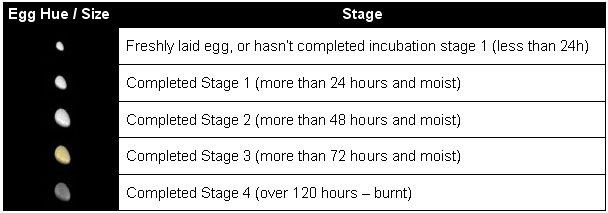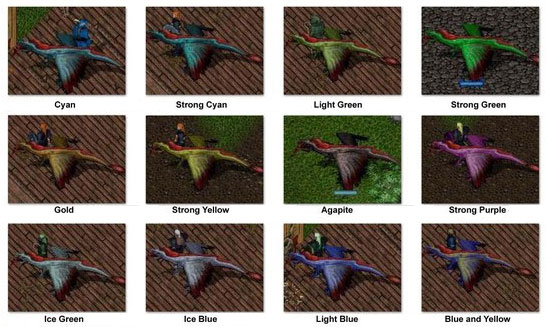![]() We have a Discord now - Join if you want to Contribute!
We have a Discord now - Join if you want to Contribute!![]()
Site Updates Coming Soon!
Chicken Lizard Breeding
A new system introduced with the Stygian Abyss expansion.
Obtaining an Egg
Bonded Pets
Chicken lizard will bond to their master like any other pet (after it has been fed at least once, then a second time 7 real life days later). Once the pet is bonded, on the day following the bonding, if the player feeds the chicken again, it will have a chance of laying an egg ![]() . If the chicken doesn’t lay an egg on that first feeding, feeding it further will not yield any egg. Player will have to wait a period of time after the first feeding. The chicken will lay a maximum of 2 eggs a week.
. If the chicken doesn’t lay an egg on that first feeding, feeding it further will not yield any egg. Player will have to wait a period of time after the first feeding. The chicken will lay a maximum of 2 eggs a week.
Loot
When killing chicken lizards, players have a chance of finding an egg as loot on their corpse.
Incubating the Egg
The egg must be placed and remain inside an incubator for 3 complete real life days to reach maturity. During that period, the player must water the egg once a day so it retains its moisture. After 72 hours, if all steps have been followed, the egg will be ready to be hatched. If the egg incubates for 48 hours after becoming mature, it will burn.
Growth Period
Whenever the egg is moved, it verifies if its destination is inside another incubator. If yes, verifies how much time it has already been incubating previously. If it has already exceeded the maximum incubation time allowed, it will burn the egg. Otherwise, it will set an incubation (re)start timer on itself which will verify every hour whether or not it has gone over the maximum incubation time.
If the egg is picked-up, it sets an incubation end time and establishes the difference between the latest (re)start timer and the current end time and adds that duration to total incubation time completed for an updated value.
Watering the Egg
Use a water pitcher on the egg once a day as every time the 24 hour period has elapsed, or it will become dry. If the egg hasn’t been watered for one day, it will be dehydrated on the following day and need to be watered twice to be healthy. Not watering the egg once will not prevent the growth of the egg. If not watered twice, the egg will not grow that day and has a 50% chance of being burnt. It also decreases its chance of yielding a battle chicken.
Growth Signs
As a visual indication of the growth stage and health to the player, the egg will change in size for each growth stage and change in hue according to its type and health. Each completed healthy stage will increase the size of the egg. On maturity, the egg will change hue indicating whether it is a normal or battle chicken lizard.
The table above is in the case the egg will yield a regular chicken lizard. If the egg ends up being a battle chicken lizard, instead of the beige hue, the egg will be one of the random hues of the hiryus (see below) and will be labeled “a mature battle chicken egg”.
Hatching the Egg
The egg will not hatch on its own. The player will have to double click the egg to break its shell. The egg can be hatched at any growth stage. The player will receive a confirmation gump asking him if he’s sure he wishes to hatch the egg.
If the egg isn’t mature enough or if the egg is burnt, the egg will crumble and the player will be informed accordingly that it was a failure. If the egg is mature, an untamed chicken lizard (or battle chicken lizard according to the type of egg) will spawn from it and the egg will be destroyed.
Vorpal Phase
If the spawned animal is a battle chicken lizard, it will automatically go vorpal and essentially act exactly the way vorpal bunny does, except slightly slower than the vorpal bunny. Unlike the vorpal bunny, it will not despawn after a few minutes. It will despawn at the normal rate any other untamed or release pets do.
Once the battle chicken is tamed, it loses the vorpal ability and its dexterity is reduced to a standard range.
Catching the chicken
Simply double-click the collar and target the chicken. If he is within range, it has a chance of catching the chicken. Since the chickens cannot “equip” the collar, a sparkling effect on the chicken will display that he is temporarily shackled. During that time, the chicken will either be paralyzed in place or its stamina will be completely drained forcing it to walk slowly. The effect should be temporary to give the players a chance to tame it. Since the chicken needs 0 taming skills, any taming attempt should be successful on first trial.
The Chicken Coop
- Allows players to stable up to 3 chickens (lizard or not) at their house
- Must be locked down or secured to be functional
- Cannot be inside a container to be used
The coop allows to bypass the use of stable slots as their data & stats stored on the coop.
- When stabled or claimed, owner's follower slots update accordingly
- Claimed pets will have same stats as when they were stabled
- Claimed pets will have same alignment as their master
- Pets can only be claimed from the coop they were stabled in
- If coop is destroyed, so are the pets it contained
Stabling the Pet
Pets are stabled and claimed using the context menu on the coop. Player must have proper permission to access this functionality. As long as the coop is empty, any player with proper access can stable a chicken there. Once a pet has been stabled, the coop becomes "bound" to the master and nobody else can stable or claim pets from it. Once all pets have been claimed, the coop bond is reset and becomes available to any player once more.
If a player has stabled chickens in a coop and loses his permissions get revoked, he will still be able to claim his remaining pets stabled within but will not be able to stable any new chickens. Once he has claimed all his chickens, he will no longer be able to access the coop.
The chicken coop is craftable by carpenters with SA entitlement.




